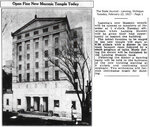

The former Masonic Temple at 217 S. Capitol Ave. has been out of use since 2008, but it may soon be the site of Lansing’s new City Hall.
Built in 1924 in a classical revival architectural style designed by Edwyn A. Bowd, the seven-story, 109,826-square-foot, limestone and buff-colored brick building was listed on the National Register of Historic Places in 1980.
The Masons, believed to be the world’s largest fraternal organization, built several temples as meeting places after establishing itself here in 1849.
The property was purchased by longtime occupant Cooley Law School for $400,000 in 1974, back when a significant portion of the building’s interior still lacked heat and water. Cooley spent more than $10 million to retain and restore its classic exterior and develop and modernize the interior, transforming it into a classroom, office and auditorium space known as the Cooley Temple Conference Center.
In 2000, the law school began a transition from the former temple building to the 10-story Cooley Center facility at 300 S. Capitol Ave. The temple hosted its final classes in 2010. Facing decreasing enrollment, Cooley then put the temple up for sale in December 2014. It did not settle on a buyer until July 2021, when the Boji Group closed on a deal to purchase it for $1.75 million. Previously listed at $8 million and later $3.4 million, the building is assessed at a value of $2,049,500 and sits on a parcel of land valued at $163,600.
Prior to the Boji Group’s acquisition, there had been speculation that local investors wanted to buy the temple and turn it into a boutique hotel. Another plan would have brought a performing arts center to the space, but it was scrapped in 2019 when city officials realized they would need to install a freight elevator to access the multi-story ballroom and auditorium area on the top floor. The performing arts center plan was also hampered by the Blue Cross Blue Shield declining to sell a portion of an adjacent parking at its Lansing Service Center on Capitol Avenue.
After finalizing its purchase in 2021, Boji Group CEO Ron Boji said he had no firm plans on how he might utilize the building. He expressed interest in turning it into a residential space for market-price apartments or even possibly reviving the hotel plans, with the expectation of spending between $20 million and $25 million on renovations. The firm had previously redeveloped several downtown properties, including the Boji Tower and the former Farnum Building, now known as The Louie.
In the nearly five-decade span of the Cooley Law School’s ownership, a great number of its renovation efforts had been carried out with an eye for sustainability. A 2011 study by the Society of Environmentally Responsible Facilities cited the property as “a classic example of adaptive reuse.”
“Though an older building, the Temple features modern water efficiency technology, a strong emphasis on recycling, and stringent air quality standards,” the organization wrote. “Older windows have been retrofitted with double pane glass, and reflective coating was applied to the existing roof to increase heating and cooling efficiency. Heavy insulation and an advanced building automation system are used to efficiently create optimal temperature conditions inside.”
Back when the building was still operating as a Masonic Temple, it featured a popular public cafeteria on the ground floor and held proms, graduation ceremonies, and other events on the sixth floor, which was two stories high and featured a stage and a mezzanine.
Support City Pulse - Donate Today!
Comments
No comments on this item Please log in to comment by clicking here